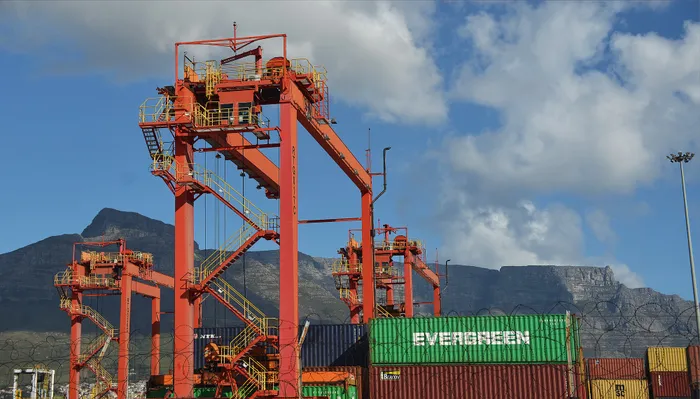
On August 1, 2025, South African exporters will wake up to a 30% tariff on all goods entering the United States, a decision announced by the administration of President Donald Trump.
Image: File
On August 1, 2025, South African exporters will wake up to a 30% tariff on all goods entering the United States, a decision announced by the administration of President Donald Trump. This is not a sector-specific sanction, nor the outcome of any formal trade dispute. It is a sweeping penalty imposed on all products, citing trade imbalances and regulatory barriers imposed by South Africa. But this is not the end of trade. It is the beginning of South Africa’s trade adolescence, the moment we decide to grow up or continue being disciplined by our “partners.”
The justification provided by the US administration rests on the claim that South Africa runs a trade surplus with the United States. In truth, South Africa exported around R170 billion worth of goods to the US in 2023 (Stats SA, 2024), largely in automotive components, citrus and minerals, while importing just over R100 billion in return. The surplus exists but it is relatively small in the context of overall bilateral trade. Trade imbalances are also not inherently unfair; the US itself enjoys surpluses with many countries.
What this tariff reveals is not a fiscal grievance but a display of geopolitical leverage, an assertion of economic power with limited regard for multilateral process. The tariff appears partly aimed at appeasing domestic political interests ahead of the 2026 midterm elections, particularly in states where trade unions are concerned about foreign competition.
However, the consequences for South Africa’s economy will be profound and immediate. South Africa is already under pressure to reindustrialise and this penalty could not come at a worse time.
The automotive industry alone accounts for over 4% of GDP and more than 110 000 jobs (Naamsa and Department of Trade, Industry and Competition, 2024). With the US as a key destination for vehicle parts and assembled models, this tariff will deal a serious blow to sectoral stability. Reports indicate that companies relocating production to the US may receive expedited regulatory approvals. In effect, this risks incentivising capital flight and weakening local value chains. This policy shift is taking place while South Africa holds the presidency of the G20 (G20 Secretariat, 2025). That irony is difficult to ignore.
We are presiding over a global forum committed to equitable development while being subjected to unilateral economic pressure by one of its most powerful members. This is more than a diplomatic discomfort; it is a direct challenge to the credibility of multilateralism. If the G20 cannot protect developing economies from arbitrary market exclusion, it must ask itself what kind of influence it truly holds. While this move falls outside the scope of Agoa, it nonetheless underscores how preferential trade access can shift at the stroke of a pen.
Past threats to South Africa’s participation in Agoa, such as the poultry trade dispute of 2015 (USTR, 2016), highlight how even codified benefits remain vulnerable to political shifts. Critics of South Africa’s trade policy may point to the use of technical regulations and local content rules. However, these are allowed under World Trade Organisation (WTO) guidelines, as outlined in the Technical Barriers to Trade Agreement (WTO, 2020).
Developing countries are within their rights to protect and promote industrial growth through policy instruments that stimulate domestic value addition. The United States also protects its own industries through farm subsidies, defence procurement and steel tariffs. To frame South Africa’s approach as uniquely restrictive is not only unfair; it reflects a double standard embedded in the global trade architecture.
This situation reflects a deeper structural issue in South Africa’s trade exposure. Our economy remains disproportionately dependent on the EU, the US and China. Even beyond the US, our exposure to external shocks is growing from the EU’s carbon border taxes to shifting Chinese demand. Diversification must be structural, not just diplomatic.
There is also a domestic reckoning to be had. South Africa’s industrial policy remains constrained by loadshedding, underinvestment in ports and rail and persistent skills mismatches. If we are to reposition ourselves globally, these internal constraints must be addressed with equal urgency. A resilient economy cannot rely solely on favourable trade preferences beyond its control. It must be built on a foundation of functional infrastructure, competitive inputs and policy certainty.
South Africa faces a choice. It can wait out the Trump presidency in the hope that future leadership will reverse course or it can act decisively now. This is not a call for isolationism. South Africa should not abandon global trade nor retaliate blindly. However, we must negotiate from a position of design rather than deference. We must ensure that this is the last time our national strategy is disrupted by external political cycles. Our trade strategy must pivot.
Already, trade with BRICS+ partners has rivalled that of individual Western blocs in recent quarters, accounting for more than 22% of South Africa’s exports in 2024 (SARB, Q4 2024). This is a foundation we can build upon. The African Continental Free Trade Area (AfCFTA) remains our continent’s most ambitious economic project. While its infrastructure is still maturing, its potential cannot be deferred any longer. Trade corridors, payment systems and regulatory alignment must be fast-tracked in practice, not just policy.
The World Bank estimates AfCFTA could lift 30 million people out of poverty by 2035 (World Bank, 2020). Parliament and the economic cluster must now take this seriously not as a trade spat but as a strategic inflection point for the country’s long-term development path. The legality of this tariff under WTO rules remains debatable, especially given its blanket nature and lack of arbitration. However, legality aside, the message it sends is unmistakable. The global playing field remains unequal and South Africa must protect itself accordingly.
This is not an argument for withdrawal. It is an argument for resilience. We cannot afford to build a 21st-century economy on the hope that global goodwill will prevail. We must design for volatility, prepare for shocks and root our trade agenda in real production, regional depth and economic clarity.
US President Donald Trump may eventually give way to a different leader but the conditions that made this tariff possible are not tied to any single administration. The unpredictability of external markets, the asymmetry of trade power and the fragility of our supply chains are structural issues. They will not be resolved with the next election. The tariffs may be American but the decision before us is South African. Do we keep asking permission to grow or do we take the blows and build something of our own?

Nomvula Zeldah Mabuza is a Risk Governance and Compliance Specialist with extensive experience in strategic risk and industrial operations. She holds a Diploma in Business Management (Accounting) from Brunel University, UK, and is an MBA candidate at Henley Business School, South Africa.
Image: Supplied
Nomvula Zeldah Mabuza is a Risk Governance and Compliance Specialist with extensive experience in strategic risk and industrial operations. She holds a Diploma in Business Management (Accounting) from Brunel University, UK, and is an MBA candidate at Henley Business School, South Africa.
*** The views expressed here do not necessarily represent those of Independent Media or IOL.
BUSINESS REPORT